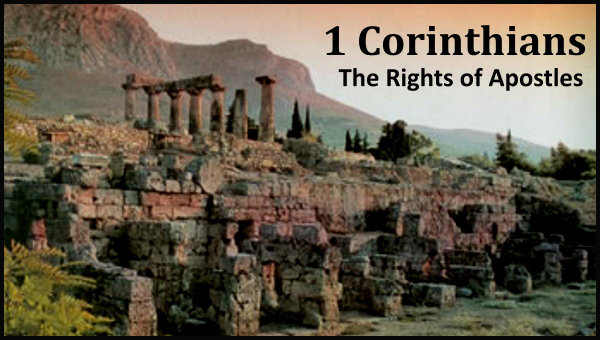By Tyson Thorne

Now let’s do a Tarantino and backtrack, let’s go back to chapter 9.1-10.13.
Paul begins chapter nine by addressing the important social issue of foods sacrificed to idols, then launches into a rant regarding his treatment by the implausible church at Corinth and their deplorable lifestyle. It’s the later of these two that we turn our attention to.
What spurs Paul’s rant? What is behind this outburst? The issue of personal rights. Though the Corinthians thought it their “right” to eat at occult ceremonies and he encouraged them to deny their rights for the sake of others. Paul is about to relate that he has put up with mistreatment from them for their benefit.
The apostle begins by defending his rights, as a free man, an apostle, and as their spiritual father. While in verse four he addresses those who do not acknowledge his apostolic authority, the real issue is their lack of support for his ministry. This is evident from verses six and 12, whereby we see “…is it only Barnabus and I who must work for a living?” and, “If others have this right of support from you, shouldn’t we have it all the more?” Evidently, greater hospitality was shown to the other apostles who visited Corinth, including Peter and his family (verse five), than they were showing to the apostle who started the church (Acts 18).
By way of comparison, a soldier serves not simply to wage war, but to earn a wage. Similarly, no one plants a vineyard to let the grapes rot on the vine, but to enjoy the fruit of the vine. Further, does not a shepherd protect his flock so he may enjoy the milk from the flock? This is not materialist talk, Paul points out, even the Old Testament teaches that all things were made for man’s enjoyment and survival. In other words, “the worker deserves his wages” (Luke 10.7). For this reason, it is Paul’s right to expect financial assistance from those he has ministered to. Yet Paul never exercised this right. Why not?
Rather than cash in on his due, he put up with their resistance, their petty squabbles, their reluctance to obey him and assist him. It was more important to Paul that he offer the gospel without charge, free of any obligation on the part of those who receive it. The gospel, not his wage, was most important. In fact, for the sake of the gospel, Paul was willing to forsake all else. He always chose the most difficult path, to observe laws he did not have to, to live in difficult circumstances, to live in weakness, all so that some might be won to Christ and so that he might share in the blessing of seeing another life changed. From such personal sacrifice comes one of the most inspirational writings of all times.
Do you not know that in a race all the runners run, but only one gets the prize? Run in such a way as to get the prize. Everyone who competes in the game goes into strict training. They do it to get a crown that will not last; but we do it to get a crown that will last forever. Therefore I do not run like a man running aimlessly; I do not fight like a man beating the air. No, I beat my body and make it my slave so that after I have preached to others, I myself will not be disqualified for the prize.
To many this passage is confusing. What is Paul trying to say? Though life is indeed a rat race, is his concern over being “disqualified” stating that he fears losing his salvation, as some attest? After all, the word translated “disqualified” (adokimos) is used elsewhere to refer to unbelievers (Romans 1:28; Titus 1.16). Even those who believe in eternal security often struggle with understanding this text. The truth is, this passage is not saying anything new.
Paul has already given this lesson twice before in different words, and is now relating it for the third time. Notice what the apostle does in .15-.18: He tells how he denied himself his apostolic “rights” so that he might continue in the ministry of the gospel and receive his “reward” (.17). In .19-.23 he states that he disciplines himself by becoming a slave (.19), becoming a Jew and submitting to the law (.20), becoming law-less (.21) and becoming weak (.22) so that he might win some and share in the “blessings” of the gospel. Now, in .24-.27 he gives the same message: by disciplining ourselves as athletes do we can run the race (which is not the Christian life, but the ministry of the gospel he’s been talking about all along), and receive the incorruptible “prize.”
This being the case, how is one disqualified from the “prize,” or “reward,” of gospel ministry? Disqualified means not receiving the reward for one’s ministry, having no godly works to show on Judgment day. How does one enter such a state? By being undisciplined (.26-.27), and by ministering involuntarily (.17). Such a man will not only find himself disqualified from the rewards of ministry, but he will suffer the discipline of the Lord, even as Paul is about to discuss regarding the children of Israel (10.1-.13). The ministry of the gospel is every believer’s responsibility. We must overcome cultural norms, and especially “Christian culture” trends, and tell everyone about the precious work of Jesus Christ.
|
|
